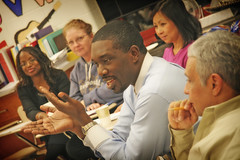USA Service.org, the official site that promotes service activities on Martin Luther King Day, was kind enough to ask me to post a blog entry over the weekend. I reproduce it here as an appropriate offering for today:
Between now and January 19th, we’ll feature a series of guest bloggers on USAservice.org. Today we’re pleased to share a post by Peter Levine, Director of Research and Director of CIRCLE (Center for Information & Research on Civic Learning & Engagement).
Just a few days before Dr. Martin Luther King Jr. was assassinated, he said:
“It is always a rich and rewarding experience to take a brief break from our day-to-day demands and the struggle for freedom and human dignity and discuss the issues involved in that struggle with concerned friends of goodwill all over our nation.”
We have lost Dr. King, but we must continue that discussion.
I’m Peter Levine from CIRCLE at Tufts University’s Tisch College of Citizenship & Public Service. I also represent a consortium of groups that organize nonpartisan discussions and deliberations in communities around America.
My colleagues and I believe that service is essential, and that it is best when it involves reflection and discussion. This weekend, volunteers can meet to choose their issues and plan their service. On January 19th, after completing a service activity, volunteers can reflect on what they learned and what they should do next. Such discussions can help turn thousands of MLK Day service events into powerful opportunities for learning, analyzing issues, forming human connections, and addressing serious, long-term problems.

Americans who volunteer on MLK Day may plan to conduct additional service together in the months ahead. They may decide to recruit others to join their efforts, conduct research, create public art and media to inform people about their cause, make changes in their homes, companies, and careers, advocate for policy changes, or even launch new organizations. They may reflect together on profound issues, like the ones that kept Dr. King thinking, conversing, organizing, and learning all his life.
USAservice.org has posted a great new toolkit to help Americans organize “Citizen Action Conversations” connected to service. The guide is flexible, but it has contains practical ideas for how to organize a productive conversation.

President-elect Obama has said, “I will ask for your service and your active citizenship when I am President of the United States. This will not be a call issued in one speech or one program–this will be a central cause of my presidency.” It is up to each of us to serve and to make our service as meaningful as possible. A great way to start is by combining a service event with a Citizen Action Conversation on this Martin Luther King Day.